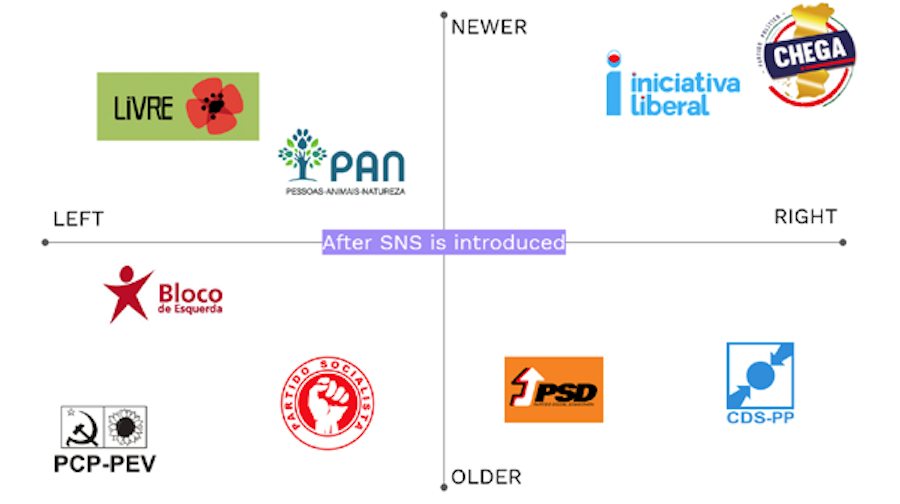Political parties in Portugal can be overwhelming and a wee bit confusing if you’re not used to having a plethora of choices. The week we arrived in Portugal, the President dissolved Parliament. This happened because the politicians in Congress could not agree to a budget referendum and negotiations were at an impasse. This was in November of 2021. Most recently, as a result of more scandalous circumstances, Parliament was once again dissolved in early 2024 and a new election is being held in March 2024.
When we first learned about how this democratic republic worked, we were absolutely enthralled. We studied up on all about the various political parties and stayed up late on election night to watch the results roll in, learning which areas tended to vote more conservatively and which ones leaned progressive.
Of Prime Ministers and Presidents
Portugal became a democratic republic after the fall of the authoritarian regime in 1974. There are two primary head figures of government, the President and Prime Minister. The President is the head of state, representing Portugal internationally and domestically. They are elected for five (5) year terms and can serve up to two terms. They are the de-facto leader of the armed forces and appoint the Prime Minister. This role is largely ceremonial. However, as we’ve seen twice since moving here, Presidents can dissolve Parliament and force a new Parliamentary election.
The Prime Minister is primarily responsible for the day-to-day operations of running the country. They are usually the leader of the political party with the majority of politicians elected in the Assembly of the Republic. The Prime Minister oversees government program implementation and the Council of Ministers who are essentially the executive branch of the government. In order to be successful, the Prime Minister must facilitate coalition building in the Assembly of the Republic. With this in mind, if Parliament loses confidence in the PM as a result of ineptitude or scandal, such as recently occurred, the Prime Minister will be forced to resign.
Political Parties in Portugal, Examples

Left-Leaning Ideology
- Socialist Party (Partido Socialista – PS):
- Ideology: Center-left
- Beliefs: The Socialist Party advocates for social democracy, emphasizing policies aimed at reducing inequality, promoting social justice, and providing a strong welfare state. It supports progressive taxation, public investment in education, healthcare, and social services, as well as environmental sustainability.
- Left Bloc (Bloco de Esquerda – BE):
- Ideology: Left-wing
- Beliefs: The Left Bloc is a left-wing party that advocates for progressive social and economic policies. It supports workers’ rights, environmental protection, gender equality, LGBTQ+ rights, and anti-austerity measures. It opposes neoliberal economic policies and advocates for wealth redistribution, public ownership of key industries, and increased social spending.
- Communist Party (Partido Comunista Português – PCP):
- Ideology: Far-left
- Beliefs: The Communist Party is a far-left party that promotes Marxism-Leninism and socialism. It advocates for the rights of the working class, public ownership of the means of production, and the establishment of a socialist society. It opposes capitalism, imperialism, and NATO membership. The party also emphasizes social justice, public services, and workers’ rights.
- Volt Portugal (VP):
- Ideology: Pan-European, progressive
- Beliefs: Volt Portugal advocates for European integration and cooperation, aiming to create a more unified and democratic European Union. The party emphasizes the need for greater solidarity among EU member states, promoting policies that address common challenges such as climate change, migration, and economic inequality.
- Livre (L):
- Ideology: Progressive
- Beliefs: The Livre party presents itself as a progressive political force in Portugal, advocating for values such as democracy, social justice, sustainability, and European cooperation. They aim to bring about positive change through inclusive and participatory politics, with a focus on addressing the pressing issues facing society today.
Environmentalist Ideology
- Ecologist Party “The Greens” (Partido Ecologista “Os Verdes” – PEV):
- Ideology: Green politics
- Beliefs: The Ecologist Party “The Greens” focuses on environmental issues, sustainability, and social justice. It advocates for renewable energy, biodiversity conservation, organic agriculture, and environmental protection. The party also promotes social equality, human rights, and participatory democracy.
- People-Animals-Nature (Pessoas-Animais-Natureza – PAN):
- Ideology: Animal rights, environmentalism
- Beliefs: People-Animals-Nature is a party that prioritizes animal rights, environmental sustainability, and social progress. It advocates for stronger animal welfare laws, environmental protection measures, and sustainable development policies. The party also supports social justice, human rights, and participatory democracy.
Right-Leaning Ideology
- Social Democratic Party (Partido Social Democrata – PSD):
- Ideology: Center-right
- Beliefs: The Social Democratic Party espouses center-right policies, favoring free-market principles, economic liberalism, and fiscal responsibility. It supports privatization of certain sectors, deregulation, and reducing the size of the public sector. However, it also emphasizes social policies aimed at supporting families, entrepreneurship, and job creation.
- CDS – People’s Party (Partido Popular – CDS-PP):
- Ideology: Center-right to right-wing
- Beliefs: The CDS – People’s Party is a conservative party that supports Christian democracy, economic liberalism, and traditional social values. It advocates for lower taxes, free-market policies, privatization, and deregulation. The party also emphasizes family values, religious freedom, and national sovereignty.
- Chega (CH):
- Ideology: Right-wing populism, nationalism
- Beliefs: Chega represents a right-wing populist movement in Portugal, advocating for nationalist policies, stricter immigration controls, and a tough approach to crime and security issues, while also challenging political elites and promoting traditional Portuguese values.
There are More
The list above represents just ten (10) of the twenty-four (24) major and minor political parties in Portugal. That’s why coalition-building is absolutely critical to pass major legislative reforms. Undoubtedly, several political parties must to team up to pass legislation, finding commonality in various areas of public policy. If a party finds itself with no support from the populace, they will go extinct and new ones are founded all the time. It’s important for everyday voters to stay informed.
Can Foreign Residents Vote?

Certain foreign residents are able to vote in Portugal, primarily based upon their point of origin. These are explained as follows:
- Citizens of European Union countries with legal residence in Portugal including Germany, Austria, Belgium, Bulgaria, Cyprus, Croatia, Denmark, Slovakia, Slovenia, Spain, Estonia, Finland, France, Greece, Hungary, Ireland, Italy, Latvia, Lithuania, Luxembourg, Malta, Netherlands, Poland, Czech Republic, Romania and Sweden.
- National citizens of Portuguese-speaking countries with legal residence in Portugal for more than 2 years such as those from Portuguese former colonies Cape Verde and Brazil.
- National citizens of other foreign countries with legal residence in Portugal for more than 3 years like those from Argentina, Chile, Colombia, Iceland, Norway, New Zealand, Peru, United Kingdom, Uruguay and Venezuela.
As you might have noticed, citizens of the United States and Canada are not included in this list. As a result, we must wait to vote until after we have received our citizen’s card at year five (5) of residency.
We personally are excited to have a choice between more than two (2) parties when we finally get to cast our votes for political parties in Portugal!

